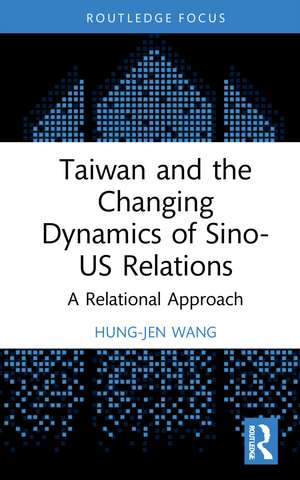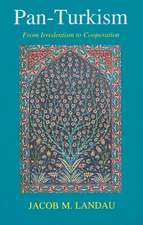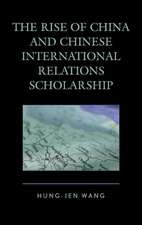Taiwan and the Changing Dynamics of Sino-US Relations: A Relational Approach: Politics in Asia
Autor Hung-Jen Wangen Limba Engleză Hardback – 7 feb 2022
| Toate formatele și edițiile | Preț | Express |
|---|---|---|
| Paperback (1) | 124.46 lei 6-8 săpt. | |
| Taylor & Francis – 25 sep 2023 | 124.46 lei 6-8 săpt. | |
| Hardback (1) | 384.33 lei 3-5 săpt. | +13.79 lei 7-13 zile |
| Taylor & Francis – 7 feb 2022 | 384.33 lei 3-5 săpt. | +13.79 lei 7-13 zile |
Din seria Politics in Asia
-
 Preț: 311.41 lei
Preț: 311.41 lei -
 Preț: 295.42 lei
Preț: 295.42 lei -
 Preț: 191.76 lei
Preț: 191.76 lei -
 Preț: 309.79 lei
Preț: 309.79 lei -
 Preț: 281.18 lei
Preț: 281.18 lei -
 Preț: 280.08 lei
Preț: 280.08 lei -
 Preț: 286.40 lei
Preț: 286.40 lei -
 Preț: 311.37 lei
Preț: 311.37 lei -
 Preț: 312.09 lei
Preț: 312.09 lei - 9%
 Preț: 934.03 lei
Preț: 934.03 lei - 18%
 Preț: 1159.75 lei
Preț: 1159.75 lei - 18%
 Preț: 1055.47 lei
Preț: 1055.47 lei -
 Preț: 420.20 lei
Preț: 420.20 lei - 18%
 Preț: 1057.20 lei
Preț: 1057.20 lei - 15%
 Preț: 701.53 lei
Preț: 701.53 lei -
 Preț: 442.63 lei
Preț: 442.63 lei - 18%
 Preț: 1003.84 lei
Preț: 1003.84 lei - 18%
 Preț: 1054.78 lei
Preț: 1054.78 lei - 18%
 Preț: 1373.57 lei
Preț: 1373.57 lei -
 Preț: 409.25 lei
Preț: 409.25 lei - 18%
 Preț: 1056.33 lei
Preț: 1056.33 lei - 18%
 Preț: 996.81 lei
Preț: 996.81 lei - 18%
 Preț: 1048.50 lei
Preț: 1048.50 lei - 18%
 Preț: 1050.98 lei
Preț: 1050.98 lei - 18%
 Preț: 1049.95 lei
Preț: 1049.95 lei -
 Preț: 409.68 lei
Preț: 409.68 lei -
 Preț: 402.84 lei
Preț: 402.84 lei -
 Preț: 413.88 lei
Preț: 413.88 lei - 18%
 Preț: 999.01 lei
Preț: 999.01 lei -
 Preț: 373.23 lei
Preț: 373.23 lei - 18%
 Preț: 701.72 lei
Preț: 701.72 lei -
 Preț: 445.16 lei
Preț: 445.16 lei - 18%
 Preț: 1052.03 lei
Preț: 1052.03 lei - 18%
 Preț: 1050.64 lei
Preț: 1050.64 lei - 25%
 Preț: 823.08 lei
Preț: 823.08 lei - 18%
 Preț: 999.69 lei
Preț: 999.69 lei -
 Preț: 391.46 lei
Preț: 391.46 lei - 22%
 Preț: 337.39 lei
Preț: 337.39 lei - 18%
 Preț: 1053.06 lei
Preț: 1053.06 lei - 18%
 Preț: 1047.74 lei
Preț: 1047.74 lei - 18%
 Preț: 1160.12 lei
Preț: 1160.12 lei - 18%
 Preț: 705.85 lei
Preț: 705.85 lei - 18%
 Preț: 1160.12 lei
Preț: 1160.12 lei - 18%
 Preț: 1051.64 lei
Preț: 1051.64 lei - 18%
 Preț: 1052.03 lei
Preț: 1052.03 lei
Preț: 384.33 lei
Nou
73.61€ • 75.84$ • 61.66£
Carte disponibilă
Livrare economică 01-15 februarie
Livrare express 18-24 ianuarie pentru 23.78 lei
Specificații
ISBN-10: 1138598135
Pagini: 86
Ilustrații: 12 Tables, black and white; 3 Line drawings, black and white; 3 Illustrations, black and white
Dimensiuni: 138 x 216 x 13 mm
Greutate: 0.22 kg
Ediția:1
Editura: Taylor & Francis
Colecția Routledge
Seria Politics in Asia
Locul publicării:Oxford, United Kingdom
Public țintă
Postgraduate and UndergraduateCuprins
2 China–US Relations Pessimism in Light of Power-Detached Relationality
3 A Multilateral Framework for US–Taiwan Relations: An Interest-Detached Relationality
4 China’s Position on UN Charter Reforms: A Relationality Dilemma
5 A Cold Peace in Cross-Strait Relations: Relationality Without Consensus
6 Taiwan-Related Images in Time and Newsweek
7 In Lieu of a Conclusion: Five Implications
Appendix: Individuals interviewed for this book and their affiliations
Notă biografică
Descriere
Wang discusses the dynamics of Sino-US Relations since 2008 and the implications for relations between Taiwan and both the US and the People's Republic of China.
Ever since China surpassed Japan to become the world's second-largest economy, it has appeared to shift its policy shift from biding our time and a self-described peaceful rise towards increased assertiveness in regional and international affairs. This has only become more pronounced since the 19th Party National Congress in October 2017, when Xi Jinping reiterated his agenda for the Chinese Dream. In contrast, the US's Pivot to Asia strategy has been widely perceived as unsuccessful. In its precarious political position between China and the US, Taiwan is especially exposed to the fluctuations in policy and diplomatic relations between the two powers. The three bilateral relationships are intertwined, with policy changes and actions in any one of them affecting the other two. Wang emphasises the small power and disputed nation-state perspective of Taiwan, over the great power politics of the US and China. In doing so he presents an analysis of how the changing dynamics of Sino-US relations and the great power transition in Asia have an impact on smaller stakeholders in the region.
A valuable resource for scholars and policy-makers with a focus on Taiwan's position in Sino-US relations.





















